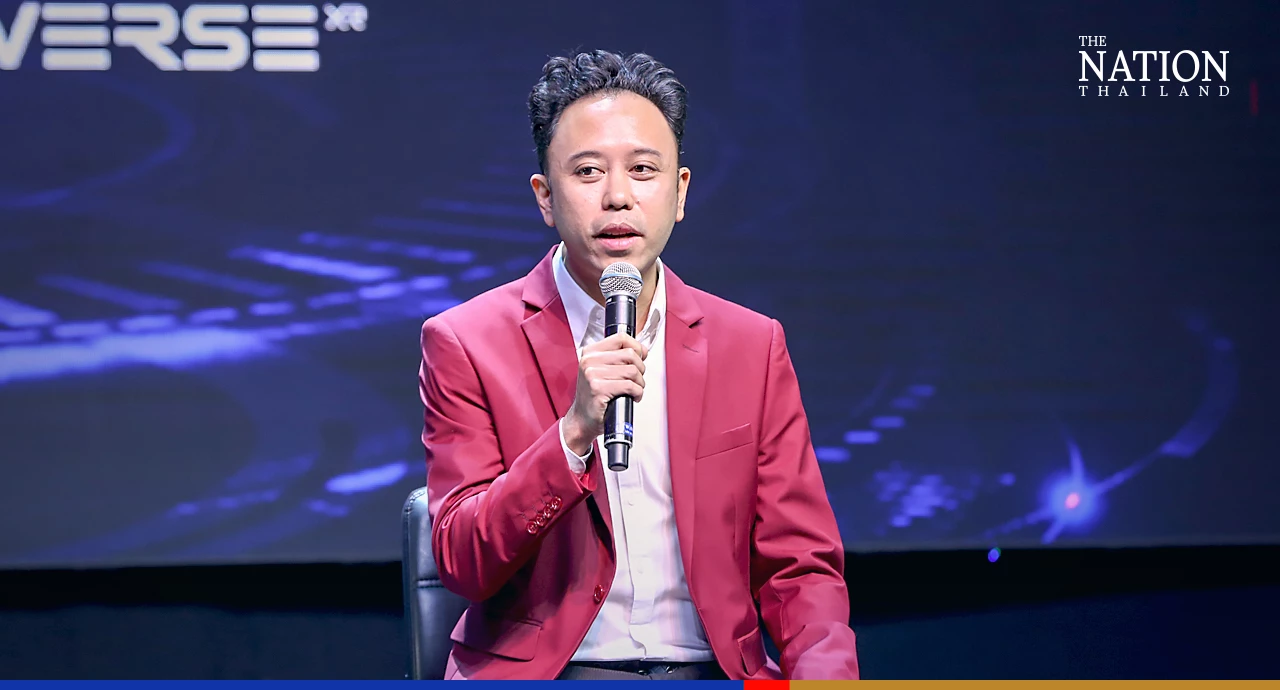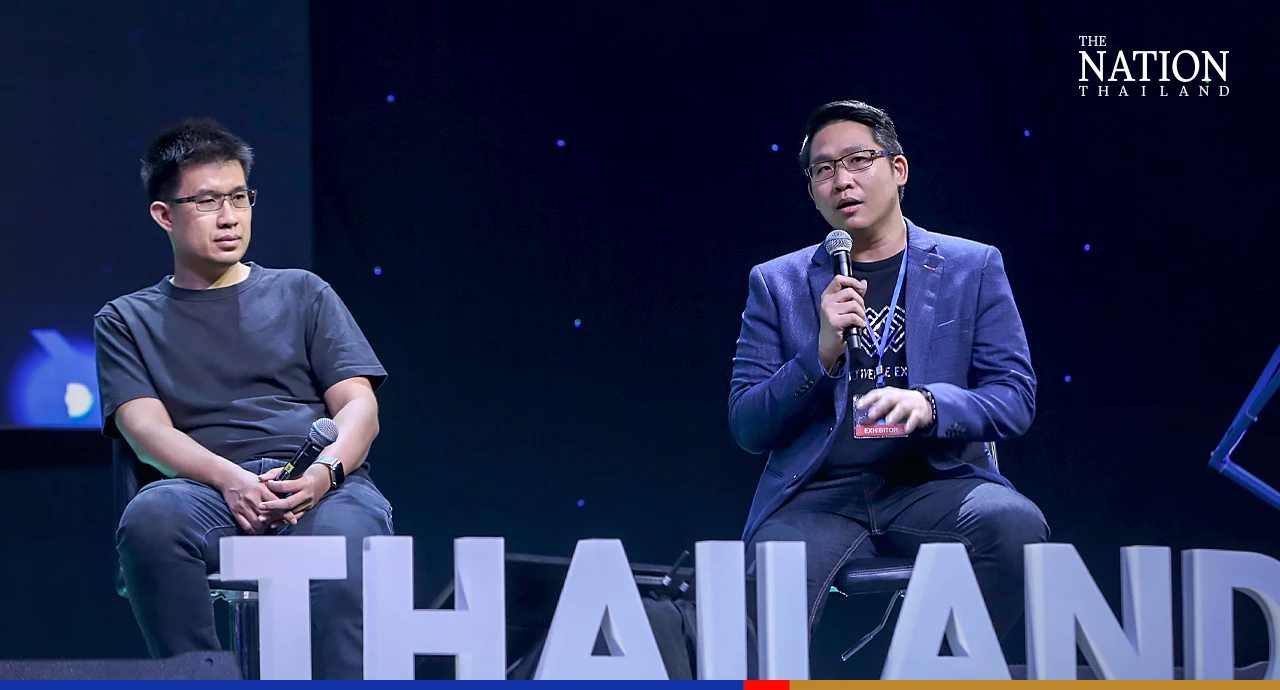August 22, 2022
BANGKOK – Nattasate Trithipcharoenchai, CEO of Jenosize Digital Group, said no one could be successful in their own isolated metaverse so his company created T-Verse to connect virtual business, education, and government sectors and boost Thailand’s competitiveness.
In a talk titled “Get Ready for Your Own ’Verse”, he said that if every metaverse sector joined hands, users would benefit from a seamless, immersive experience while developers could compete on the global stage.
He added that the challenge was not how to create the metaverse, but how to make it a success. And success depended on creating everyday accessibility for people. Currently, to enter metaverse worlds, users need relatively expensive gadgets like virtual-reality (VR) headsets.
Nattasate also highlighted security concerns, explaining that users would need to feel safe when they create their second identity in the metaverse.
Content was also an issue as users will want engaging activities while spending time in the virtual world.
He went on to explain the core metaverse concept of “Digital Twins”, citing the example of a user who buys a costume for their 3D avatar that is identical to their real-world outfit. He also described the metaverse as communities where users could meet and hang out with friends
Finally, he said commerce would be a crucial aspect since the metaverse will not be sustainable without money or profits.

Jinthita Chanthasuwannasin, a Jakaverse development team executive, boasted Jakaverse will be the biggest gaming metaverse, with more than 1,000 immersive games.
Jakaverse is also focusing on e-commerce, with Thai brands already buying up land in its virtual world. Singha Corporation has purchased 100 blocks of land while the Mall Group plans to build malls in the Jakaverse.
She also mentioned that her company will be one of the first Thai developers to make its metaverse compatible with VR glasses.

Jakaphan Prachuabmoh, a member of the Jakaverse development team, said that Generation Alpha children (born 2010-2020) are already in metaverses like Roblox or Fortnite but they are not decentralised metaverses.
He said these kids will teach their parents how to access the metaverse just as children now teach baby boomers to use Line or Facebook.
Meanwhile, in building a metaverse, developers must create enjoyable experiences that differ from the real world to give users a break from their busy everyday lives, he added. The metaverse’s selling point must also be clear.
The purchasing of land was another important aspect of the metaverse. Just as in the real world, different metaverses will have different strengths and the price of virtual will become more expensive in the future.
Jakaphan also mentioned that metaverse devices and infrastructure will gradually become smaller and easier to use.
He added that big companies such as Facebook and Microsoft are already developing metaverse gadgets so other companies should hurry if they want to jump into the market.

Pongwud Praipaisankij, CEO of Multiverse Expert, said his company does not have its own platform but is creating metaverses and their functions for customers.
Multiverse Expert is also developing GameFi (Game + Finance) applications with several game engines. Two games will feature on Thailand’s Bitkub Chain ecosystem.
He echoed the importance of accessibility, noting that Web 3.0 virtual technology required users to undergo several processes before entry. He said accessibility would be a decider of whether people choose to enter the metaverse or not.
Use cases were also important as almost every “verse” in Thailand launched by first selling land and buildings and opening them but is now deciding what to do with them.
He also sees differences in Europe and Asia. Metaverses in Europe focus mainly on decentralised finance while metaverses in Asia (mostly South Korea) tend to start with a single function and later seek collaboration with other metaverses, he said.
Pongwud added that standards and standardisation were also important. He mentioned that every verse he had created used the same technology, so they could be connected easily.
He said that the Metaverse Association of Thailand has been founded to set a standard for metaverses in Thailand so they could compete against counterparts in places like Europe, where they already share technologies.
Pongwud said that users would be bored if they stay in a single metaverse for a long time and will want to visit other verses just as people travel to foreign countries.
He also recommended that developers stop hyping the metaverse and start focusing more on business models and what people will gain.
He summarised his point as: “Ignorance will be expensive.”

Worawisut Pinyoyang, co-founder of Learnity, said his company is using immersive Web 3.0 technology to build a digital academy and infrastructure to tackle education problems.
He said that educational technology is solving issues such as credit transfers and forgery of certificates and reports.
He also agreed there needs to be a central organisation so Thai developers can join hands and expand to the international market.
As a decentralised applications developer, Worawisut said that Thai developers’ mindset is focused too narrowly on serving the Thai market while foreign developers are a step ahead and thinking about the global market.
He added that the public should focus on metaverse fundamentals rather than being scared away by temporary phenomena such as the crypto crash.
He concluded that the metaverse would be the first opportunity for Thai developers to compete equally with foreign developers.
The three-day “Thailand Metaverse Expo 2022”, sponsored by The Nation, wrapped up on Sunday.
#ThailandMetaverseExpo2022
#ThailandMetaverseExpo
#TheNation
#TME
#NFTThailand
#Thailand #Metaverse


